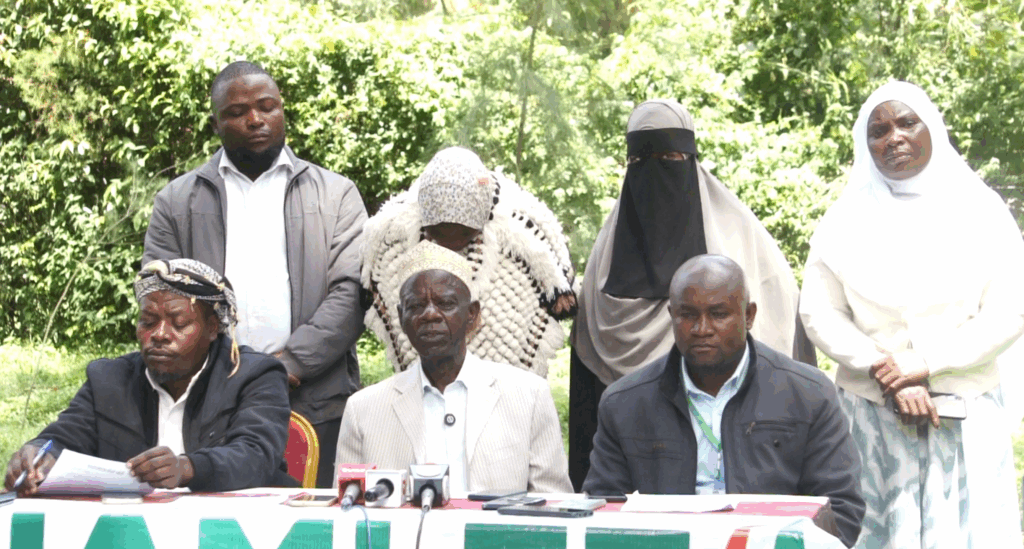
By Violet Auma | violetmedia8@gmail.com
A major legal and religious storm is brewing across Kenya following a landmark Supreme Court ruling that allows children born out of wedlock to inherit from their Muslim fathers.
Muslim leaders under the National Muslim Leaders Forum (NAMLEF) and the Supreme Council of Kenya Muslims (SUPKEM) have condemned the ruling, terming it a direct contradiction of Quranic teachings and a blow to the authority of Sharia law and the Kadhis Court.
Speaking during a press conference in Kakamega town, key Muslim leaders including Sheikh Abu Muhsin Kassim (NAMLEF Western Region Chair), Suleiman Anami (NAMLEF National Official), and Sheban Wafula (SUPKEM Kakamega Chair) said the ruling amounts to judicial overreach into religious matters.
“The ruling by the Supreme Court is against the Quran,” said Sheikh Kassim. “Islam clearly states that children must be sired within a lawful marriage. Anything outside of that has no inheritance rights under Islamic law.”
They accused the judiciary of eroding the constitutional role of Islamic courts by overturning a decision already made by the Kadhis Court, which had previously dismissed the case.
“This judgment not only violates our religious doctrine but also renders the Kadhis Court a toothless institution,” said Suleiman Anami. “It sends a message that religious rulings are secondary to secular interpretations even in matters clearly defined by our faith.”
The dispute stems from a case filed by Fatuma Athman Abud Faraj, who sought to block children her late husband, Salim Juma Hakeem Kitendo, fathered outside their Islamic marriage from inheriting his estate.
Fatuma, who had four children with Kitendo within a formal Islamic union, argued that Islamic law does not recognize children born out of wedlock as legal heirs.
The Supreme Court, in its June 30 ruling, disagreed affirming that such children have a constitutional right to inheritance, regardless of religious doctrine.
Muslim leaders, however, insist that only children born within a nika (recognized Islamic marriage) are considered legitimate in matters of inheritance.
They are now calling for a judicial review and amendments to the law to solidify the role of the Kadhis Court in such matters.
“There needs to be a clear provision in law that the Kadhis Court’s ruling on matters of Islamic inheritance is final,” said Sheikh Kassim. “We cannot keep going back and forth. Our faith is not on trial.”
SUPKEM Kakamega Chair Sheban Wafula added: “This ruling puts us in a very difficult position. We are being forced to choose between obeying the law of the land and disobeying our faith. That is unacceptable.”
While acknowledging the importance of caring for all children regardless of their background, the leaders emphasized that inheritance should remain governed by religious principles.
They proposed that the government explore social welfare programs or trusts for children born out of wedlock instead of forcing a redefinition of Islamic inheritance laws.
“It’s not that we want to punish any child,” said Anami. “But we also cannot bend divine law to fit modern legal interpretations. There are other ways to support these children without interfering with our religious order.”
In a separate concern, the leaders criticized the ongoing construction of a church within the State House grounds, warning it could deepen religious divides.
“Today it is a church in State House. Tomorrow, if a Muslim becomes president, will he be expected to convert State House into a mosque?” posed Wafula. “We must stop politicizing religion and focus on uniting Kenyans.”
“You cannot bribe God by building churches while ignoring justice, equity, and service to the people.” He added.
To many in the Muslim community, the Supreme Court’s decision represents more than a legal shift, it reflects what they view as a growing disregard for religious freedom and autonomy.
“We are not just defending culture. We are defending the word of God,” said Sheikh Kassim. “Let the courts do their work, but let them stay away from matters where the Quran is final.”



